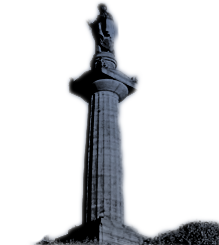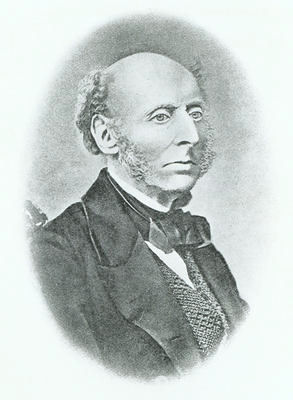John Strang
This material was researched and kindly sent to us by Morag T. Fyfe of the West of
Scotland Family History Society.
Glasgow Herald (Glasgow, Scotland), Wednesday, December 9, 1863; Issue 7462
DEATH OF JOHN STRANG, ESQ., LL.D.
With no ordinary regret we announce the demise of our City Chamberlain, which took place yesterday morning at two o’clock, and we are certain that similar regret will be felt by thousands of our fellow-citizens when the sad event is made known to them. At the beginning of the present year he found his health somewhat impaired, and during the summer he sought repose and improvement by his wonted sojourn on the Continent; but no real amendment followed, and now, after a brief confinement, he has paid nature’s last debt.
He was the son of John Strang, Esq. of Dowanhill, a wine merchant in Glasgow, and was born in 1795. When only fourteen years of age he lost his father; and his tutors designing him for mercantile life, while they bestowed on him a moderate amount of classical learning, devoted a more than ordinary portion of his youth to the cultivation of modern languages, particularly French and German, in both of which he became a proficient. He succeeded to his father’s business, but did not attempt to extend it or even to preserve it, preferring the exercise and enjoyment of his literary tastes, in which a competent share of this world’s wealth, left him by his father, enabled him to indulge.
He visited and resided some time in France and Italy in 1817, and his previous fondness of French literature was strengthened by his mixture with French society. During his whole life, indeed, one of his chief and frequent enjoyments was a visit to the Continent, especially to France. At home, he spent much of his time in translating from the French and German languages the more attractive tales and short poems published in these languages, and the periodicals of the day contain many translations from his pen.
While yet comparatively young, he translated from the German and published anonymously a small volume, titled ” Tales of Humour and Romance, from the German of
Hoffman and others.” These pursuits led to a somewhat extensive and very friendly acquaintance with the literary men of London, Paris, and Germany; and his intercourse with them, at all times a source of great pleasure to him, ended only with his life. In addition to the literary tasks alluded to Dr. Strang early in life indicated a partiality for the Fine Arts. He profited by his opportunities of inspecting the picture galleries of the Continent, and as a critic on art, at once genial and discriminating, he excelled. One of his contributions to Fine Art criticism appeared in a little volume, published in 1830, under the pseudonyme of Geoffrey Crayon jun., “A Glance at the Exhibition of the Works of Living Artists, under the Patronage of the Glasgow Dilletanti Society,” in which he foretold the future success of various artists then obscure and unnoticed, and now well known to fame. But he was more than a critic—he was also a sketcher, and many of his sketches possessed considerable merit. It was in these sketches that he first exhibited his love of his native city. He was indeed a true Glasgowegian.
Accordingly, in the exercise of this art, he discovered, and in numerous cabinet sketches depicted, the odd habitations and memorable relics of Glasgow; and, from the same source, we are inclined to trace the deep interest he felt in the improvements of his native city. To him we are indebted for one of the most beautiful garden-cemeteries in Europe. He found an almost barren hill, crowned with a few Scotch firs, and totally unproductive, which frowned on our time-honoured Cathedral, and he saw at once in the worthless Fir Park an admirable site for a Necropolis. With great energy he devoted himself to the conversion of this old and worthless Fir Park into a picturesque cemetery, and after pressing this change on the attention of his fellow-citizens in the newspapers of the day, he published in 1831 a small volume titled ‘Necropolis Glasguensis,’ in which he strongly advocated the measure. His advocacy was successful—the Fir Park gave way to the Necropolis, and thus the Merchants’ House of Glasgow now draw a large revenue from a piece of ground and rock which formerly yielded nothing, and Glasgow possesses a cemetery which for beauty of situation is, perhaps, unsurpassed in Europe.
Dr. Strang had always a parental fondness for this child of his taste, and on his deathbed expressed a decided wish to be buried within its precincts, though possessing a family burial place in one of our church yards. Often, too, did he refer with pleasure to the visit of Von Raumer, the celebrated Professor of History in Berlin, and a traveller in many lands, who, shortly after it was opened, declared his conviction, after having seen almost all the cemeteries in Europe, that the Necropolis of Glasgow would yield to few in picturesque beauty, and to none in romantic effect.
In the same year, 1831, Dr. Strang made a very extended tour through Germany, and during its progress he addressed letters from the principal cities and towns to a friend in Glasgow, conveying his impressions of the people and their country. This tour was also productive of another gratification to him; he strengthened and increased his friendships with German men of letters—among others, with the translator of the works of Shakespeare and Burns. Other avocations occupied his time for three years after his return, and it was not till 1836 that he collected his letters and published them in two octavo volumes, under the title of “Germany in 1831,” which were well received by the public, and reached a second edition.
In 1832 Dr. Strang undertook a task of no ordinary difficulty—the editorship of a Glasgow daily paper of a literary nature, supported by amateurs, each number consisting of eight folio pages. In London, thirty years ago, such a task, even when supported by paid contributors, would have been a very onerous one; in Glasgow, it was one of overwhelming difficulty. Yet, for six months, from 2d January to 30th June, 1832, each morning regularly produced its “Day.” Many of Dr. Strang’s shorter pieces in prose and verse, original and translated, appeared in this periodical.
At length, in the spring of 1834, the responsible office of Glasgow City Chamberlain became vacant, and the public voice at once pointed to Dr. Strang as the only gentleman who ought to fill it. To this voice the first reformed City Council at once gave effect, and without solicitation or canvass he was appointed—an appointment applauded, at the time, and which during thirty years never elicited a complaint or even a regret from either Councillors or constituency.
The office Dr. Strang now held brought him so prominently and frequently before the public, and our readers must be so well acquainted with the admirable manner in which he discharged its duties, that it would be unpardonable to continue our sketch at any great length; but we may be permitted to observe that in one respect his literary accomplishments and gentlemanly demeanour were productive of no ordinary advantage both to the city and its Chief Magistrates. It would scarcely be fair to expect that in a busy manufacturing and commercial community like that of Glasgow, even its Chief Magistrates should be qualified to administer their courtesies in the languages of France and Germany to distinguished natives of these countries who might visit us.
In Dr. Strang, however, they had always a ready and an agreeable substitute; and so unostentatiously, yet so effectively, did he perform the duties which thus devolved on him, that no Royal or noble foreigner left our city without the expression of the highest satisfaction and the warmest thanks. But this portion of the Chamberlain’s duties was rather a relaxation to him than a business. Accordingly, he threw his whole mind into the real labours of his office—the pecuniary affairs, the statistics, and the improvements of Glasgow and its population. In the performance of these duties he was more interested than in the management of his own affairs; and the result was, clear and satisfactory statements of accounts, laborious and frequent reports full of statistical and sanitary information, and well-considered suggestions of future improvements. In some of these duties a qualified successor may be found—in the whole of them, Glasgow by his death has sustained a loss that we despair of seeing adequately supplied.
Dr. Strang’s official duties and his annual elaborate reports on our manufactures, departments of labour, employments of the population and their crimes, general statistics, and sanitary as well as moral condition and improvement, occupied his time so completely that nearly twenty years elapsed before he published another work. In the end of 1855 he did publish “Glasgow and its Clubs,” in which will be found an exceedingly curious history of our society and manners during the latter half of the last century. This work also went through two editions. We have already mentioned that during the last summer he visited the Continent in the hope of improving his health. We may now add that he spent nearly two months in France and Italy, and amused himself by writing letters from various cities in these countries, which appeared in our journal. After his return to his official duties, he found his strength unable to bear the daily fatigue, and in the beginning of November he was obliged to confine himself to his house, where he found pleasure in collecting and revising the letters addressed to us, and last week they were published in a little volume, titled “Travelling Notes of an Invalid in Search of Health.” Only two weeks ago he penned the modest little preface prefixed to this pretty volume.
Our townsman maintained, until the last, an intimate correspondence with many men, distinguished in science and letters, both in this country and on the Continent; and it is worthy of notice that some years ago the University of Glasgow conferred upon him the honorary degree of Doctor of Laws. In December, 1842, Dr. Strang married Elizabeth Anderson, daughter of the late William Anderson, M.D., one of the most distinguished physicians in Glasgow of his day. Mrs. Strang survives him.
Thus has passed away from among us a man of mark whom Glasgow can ill spare. Gentle, accomplished, modest, and laborious, he held the even tenor of his way well known to his fellow-citizens, and by them universally beloved. In a literary and statistic view, he has done more for his native city than any of her sons; and his municipal services have been appreciated and acknowledged by every magistracy since be received his appointment. He had many personal friends who frequently sought his company, and by whom he was highly esteemed. Only two months ago he received a gift from a few of their number of almost princely magnitude. The best epitaph of humanity may be freely accorded to his worth- he has not left an enemy. For ourselves, so serene was our intercourse, so open and honest our confidences, that we fail to realise, and can scarcely admit, his departure. A judicious friend, uniformly kind and forbearing, of sterling integrity, amiable, unostentatious and intelligent, a scholar and a gentleman, has closed a career of great usefulness, and amidst regrets which will be felt most keenly by those who knew him best. We may not pursue the painful theme.
During forty years of intimate friendship no jarring word ever marred our pleasures—no difference of opinion ever lessened the warmth of our association; and now that the silver cord is broken, we look with sadness on the void thus left, and feel more intensely than ever the vanity of earthly wishes and enjoyments.










